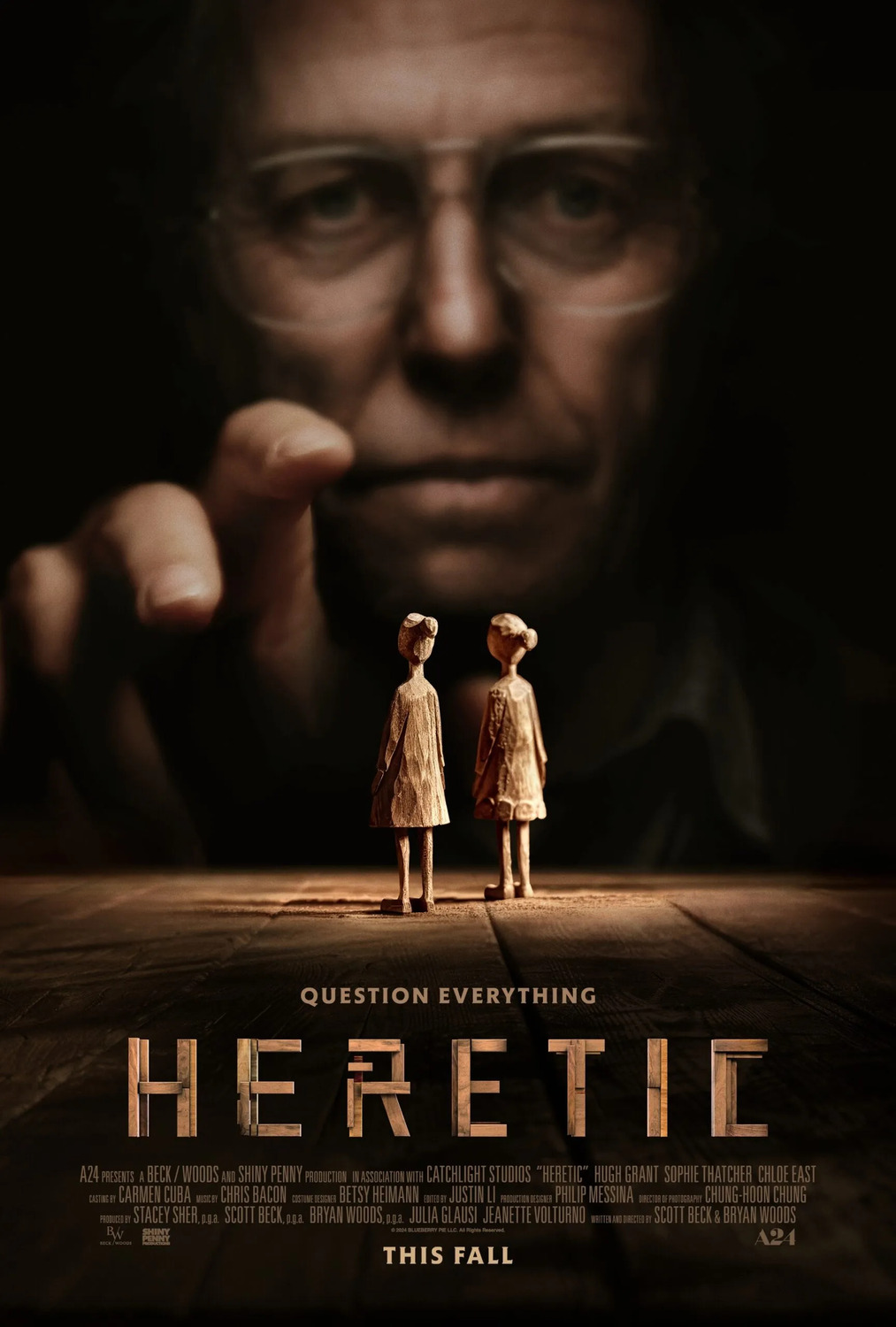Director
Scott Beck
Bryan Woods
Starring
Hugh Grant
Chloe East
Sophie Thatcher
The film opens with two Mormon missionaries, Sister Barnes [Thatcher] and Sister Paxton [East], doing their rounds, speaking with the citizens of a quiet midwest American town. One particular individual who has reached out to learn more is Mr Reed [Grant]: a polite older British gentlemen who invites the pair into his home to shelter from the storm. As he debates theology with them, it becomes clear that Reed has an ulterior motive and nefarious intent.
Following the dismal disappointment that was 65 it’s nice to see directors Beck and Woods reverting to an entirely stripped-back, thought provoking chamber piece. One centred on an engaging script, engrossing characters and lush (albeit voguishly dark) cinematography. And thanks to its almost fairy tale opening, it sets the slowburn, glacially unfolding tone so well. Essentially doubling as cautionary tale and morbid science experiment, with a script that immediately connects you to these three core characters and draws you in. All the while leaving you hanging on tenter hooks, questioning whether this is a story of serial killer mind-games or supernatural horror.
The universally big talking points to take away from this feature are going to be the acting and the debate at the heart of the narrative. So let’s start with the former. Over the last few years Hugh Grant has given career best performances by completely ditching his rom com origins and fully embracing conniving villains. Not only because he can embody evil or twisted intentions well but because he does it in such a disarming way. In fact, Reed is initially portrayed with an element of reasonableness to his actions. The definition of the all too familiar archetype of “just hear me out” while committing awful acts. Reed openly confesses he has studied and scoured every major religion, cult and sect looking for the one true God – in his own words, “The last thing I wanted to do was find the one true religion. But unfortunately I did.” But the pageantry and intimate setting of how he presents this information, is frankly compelling. Which is what makes it and him so dangerous.
By comparison, Barnes and Paxton are presented as gullible innocents – meaning you are lulled into a sense that these two young women are naive, inexperienced to the world and out of their depth. This is setup perfectly in the opening conversation, as they simplistically dissect pornographic material, are rejected and ignored by several townsfolk, as well as suffering a prank at the hands of teenagers. You instantly feel for them and their uphill mission, while also quietly damning them in a “what did you expect” accusatory tone. This is then masterfully turned on its head with the underestimation of the defiance and rationale of youth – even in those you believe to be indoctrinated. None of which would be possible if East or Thatcher were unable to convey that very real range of emotional complexity.
Moving to the second point, this movie is one half horror film, one half theological debate. In fact, for the first hour, it’s almost entirely conversations between three individuals under the looming threat of jeopardy. In other words, you will sit and listen to every word I have to say because that’s what I have ordained; whether you want to or not. At its core, Heretic has a spectacularly simple premise but it presents it in the most utterly captivating way – largely thanks to the have your cake and eat it dialogue. For a bit more (entirely spoiler free) context, Mr Reed claims all religions are watered down cash-ins and distortions of some ancient principle based on fear. Fear of death, fear of the unknown, fear of others, etc. To illustrate this, he uses the board game Monopoly and details how it evolved from The Landlord’s Game, before being diluted further to regional gimmicky iterations sold everywhere. It’s the prime example of an arrogant “debate me” man with fairly hollow bitesize arguments that, initially, feel poignant. But it doesn’t take long before Sister Barnes challenges this and picks apart the flaws and weaknesses in the simplicity of this analysis. In essence, the film wants to have this debate but also undermine it immediately. And, for some, this will feel like a manufactured closed loop; the kind of writing that bats neatly constructed barbs back-and-forth knowing they will cancel each other out. I’m of the opinion that simply having the conversation is what’s important and less the conclusion the film settles upon. And as such, the presentation and discussions between the characters is a huge highlight for me.
When it comes to the themes, execution, and overall peril, there will be certain viewers who feel Heretic comes up short. For those individuals, all the movie achieves and addresses will be weighed up against the promise of what could have been, and that will supersede what the film actually delivers. But going in as blind and open-minded as possible is key to enjoying this film on the stage it sets out. Sure, there are gory acts of violence, unsettling imagery, and a very 21st century philosophical debate, but the real talking point focuses on the stories we’re told and the men behind said stories. And that makes it equal parts riveting and terrifying – as all good horror should be.
Release Date:
01 November 2024
The Scene To Look Out For:
**significant spoilers in this section**
While there are plenty of standout moments and revelations in this story, the setup and pay off of one visual felt like a cherry moment. Specifically, the final image of the butterfly landing on Paxton’s hand. Accompanied immediately by the cut-away shot to her expression and then the reveal that the butterfly has gone. Was it ever there? Is it coincidence? Or is it a sign? This is the very tenet of the debate at the heart of not only this film but faith in general, and it’s a prime example of that aforementioned have your cake and eat it writing that doesn’t actually pick a side, allowing viewers to come to their own conclusion.
Notable Characters:
**more significant spoilers in this section**
I was going to mention the throwaway distraction that was an appearance by Topher Grace but instead, I’ve got to expound on Grant’s performance some more. As stated earlier, Grant isn’t some looming behemoth, nor is he loud and rageful. Instead, he’s somewhat meek and restrained. Meaning the subtle threat of Mr Reed is not laced in the potential for violence but more through cordiality and rationality. And this mild temperament is wholly deceptive, tricking the audience into feeling that because he’s being somewhat calm and rational, that the danger is an existential one. Even Barnes says “We might not be a physical threat but we can be an intellectual one.” All of which is stripped away when the veneer drops and the physical violence is suddenly very real and very present and you feel almost frustrated that you allowed yourself to believe otherwise.
Highlighted Quote:
“If revelation is by god, through man.. but man lies and sins and is flawed. So how do we know that any of it is true?”
In A Few Words:
“Tense, uncomfortable, and remarkably effective in its straightforward execution and strong performances.”
Total Score: 4/5

![The Red Right Hand Movie Reviews [Matthew Stogdon]](https://reviews.theredrighthand.co.uk/wp-content/uploads/2021/12/cropped-header1.png)



